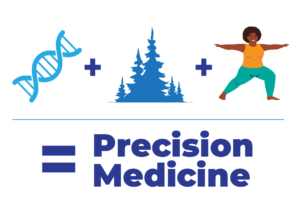Models of Care Toolkit
 Precision medicine
Precision medicine
Precision medicine, also known as personalized medicine, is an innovative approach that uses a person’s genes, environment and lifestyle to guide medical decisions. In the cancer system, precision medicine presents an opportunity to design treatments specifically for an individual which may be more efficient than general treatment regimens.
Clinical pharmacists can play a key role in supporting oncologists to develop targeted treatment and educating patients on their specific treatment protocol.
As precision medicine becomes more common in cancer treatment, pharmacy education will need to evolve to prepare pharmacists to interpret genomic tests and develop targeted therapies.
Clinical pharmacy plays a key role in Indiana University’s Simon Cancer Centre’s Precision Genomics Program. The program receives 15 to 20 referrals a week for patients who need tumours to be genetically sequenced. Eighty-three percent of patients referred to the program receive genomic-directed recommendations and proceed to new treatments or clinical trials.
Indiana’s comprehensive program includes oncologists, scientists, nurses, genetic counsellors, an oncology pharmacy specialist and two oncology pharmacy residents. The oncology pharmacist is involved across the patient continuum of care. They collaborate with oncologists and scientists to interpret genetic sequencing and provide treatment recommendations, educate patients on the results of sequencing and the potential treatments, and procure off-label medications.
- Williamson S, Beaver K, Gardner A, Martin-Hirsch P. Telephone follow-up after treatment for endometrial cancer: A qualitative study of patients’ and clinical nurse specialists’ experiences in the ENDCAT trial. Eur J Oncol Nurs. 2018;34:61-67.
- Beaver K, Williamson S, Sutton CJ, Gardner A, Martin-Hirsch P. Endometrial cancer patients’ preferences for follow-up after treatment: A cross-sectional survey. Eur J Oncol Nurs. 2020;45(101722):101722..
- Beaver K, Williamson S, Sutton C, et al. Comparing hospital and telephone follow-up for patients treated for stage-I endometrial cancer (ENDCAT trial): a randomised, multicentre, non-inferiority trial. BJOG. 2017;124(1):150-160.
- Cohen PA, Webb PM, King M, et al. Getting the MOST out of follow-up: a randomized controlled trial comparing 3 monthly nurse led follow-up via telehealth, including monitoring CA125 and patient reported outcomes using the MOST (Measure of Ovarian Symptoms and Treatment concerns) with routine clinic based or telehealth follow-up, after completion of first line chemotherapy in patients with epithelial ovarian cancer. Int J Gynecol Cancer. Published online 2021:ijgc-2021-002999.
- Schenker Y, Althouse AD, Rosenzweig M, et al. Effect of an oncology nurse-led primary palliative care intervention on patients with advanced cancer: The CONNECT cluster randomized clinical trial: The CONNECT cluster randomized clinical trial. JAMA Intern Med. 2021;181(11):1451-1460.
- Komatsu H, Yagasaki K, Yamaguchi T, et al. Effects of a nurse-led medication self-management programme in women with oral treatments for metastatic breast cancer: A mixed-method randomised controlled trial. Eur J Oncol Nurs. 2020;47(101780):101780.
- Nelson S, Turnbull J, Bainbridge L, et al. Optimizing Scopes of Practice: New Models for a New Health Care System.; 2014. Accessed November 22, 2021. https://www.cahs-acss.ca/wp-content/uploads/2014/08/Optimizing-Scopes-of-Practice_REPORT-English.pdf
